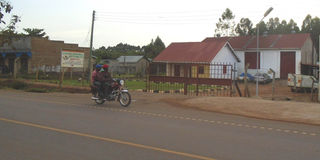Anger rises over govt factory closed one month after opening

A motorist rides past the idle soap factory in Bukolooto Town in Kayunga District which was commissioned by President Museveni in 2013. PHOTO | FRED MUZAALE
What you need to know:
- In 2019, a cross section of leaders in Kayunga District petitioned the Anti-Corruption Unit of State House to investigate circumstances under which the factory had remained redundant for such a long time.
Youth and women leaders in Kayunga District have lost hope of reaping the fruits of a soap and cooking oil factory which was set up in the area in 2013.
The Shs1 billion factory at Bukolooto Trading Centre that was donated by government was expected to create at least 100 jobs to the youth and increase household incomes among the peasant farmers.
It was also expected to provide ready market for their produce such as sunflower and groundnuts, which are its raw materials. However, the factory closed one month after President Museveni commissioned it.
The project was initiated by Kayunga Industrial Development Park, under the stewardship of Ms Idah Nantaba, the former State minister for Information and Communication technology (ICT) and also Kayunga District Woman MP.
Now completely ruined and a habitat for stray dogs and the compound being used as grazing ground for cows and goats, the factory’s closure has since resulted into a public outcry, with many of the locals asking for the President’s intervention.
Mr Ivan Kayemba, the former Kayunga District youth council chairperson, said: “We have since petitioned Mr Moses Byaruhanga, the senior presidential advisor, on political affairs and other government officials about the state of the factory, but we have not received any help in that regard.”
He added that they are now left with an option to mobilise all ruling National Resistance Movement supporters in the district to come out and demand answers.
In 2019, a cross section of leaders in Kayunga District petitioned the Anti-Corruption Unit of State House to investigate circumstances under which the factory had remained redundant for such a long time.
The leaders, who were led by Mr Kayemba, currently the youth male district councillor, asked the unit to investigate Ms Nantaba for allegedly “hijacking” the factory meant for youth and women in the area.
A reliable source that once worked at the factory, but prefers anonymity, says most of the factory’s machinery were removed by unknown people while the whereabouts of two trucks for the factory is not known.
When contacted, Ms Nantaba said she did her part to lobby for the project and is not responsible for the current mess.
“I did my part to lobby for the project,” she said without disclosing much information.
In an earlier interview about the project establishment, Ms Nantaba said they had hoped to buy the raw materials for the factory from other districts such as Teso, Pallisa, Kaberamaido, and Busoga sub-region, where the crops are cultivated, but noted that they eventually realised that it was not cost-effective to do so.
It is worth to note that both Kayunga and the neighbouring districts of Mukono, Buikwe and Luweero are not known for sunflower or groundnuts growing because of their unsuitable climate and soils for both crops. In some cases, they are grown on subsistence scale.
Residents in Ndeeba, who are neighbours of the abandoned factory, but spoke on condition of anonymity, complained that the abandoned factory is a security threat because thugs use it as a hideout.
Kayunga District chairperson Andrew Muwonge said he would investigate why the factory closed.
“I think we need to work together as leaders to see that the factory is revamped. We need such factories for job creation and to act as market for our produce,” he said.
With a population of about 420,000 people and being known for pineapple and banana growing, Kayunga has no food processing industries besides some few that process coffee.
READ MORE: Leaders clash over Shs1b oil factory




